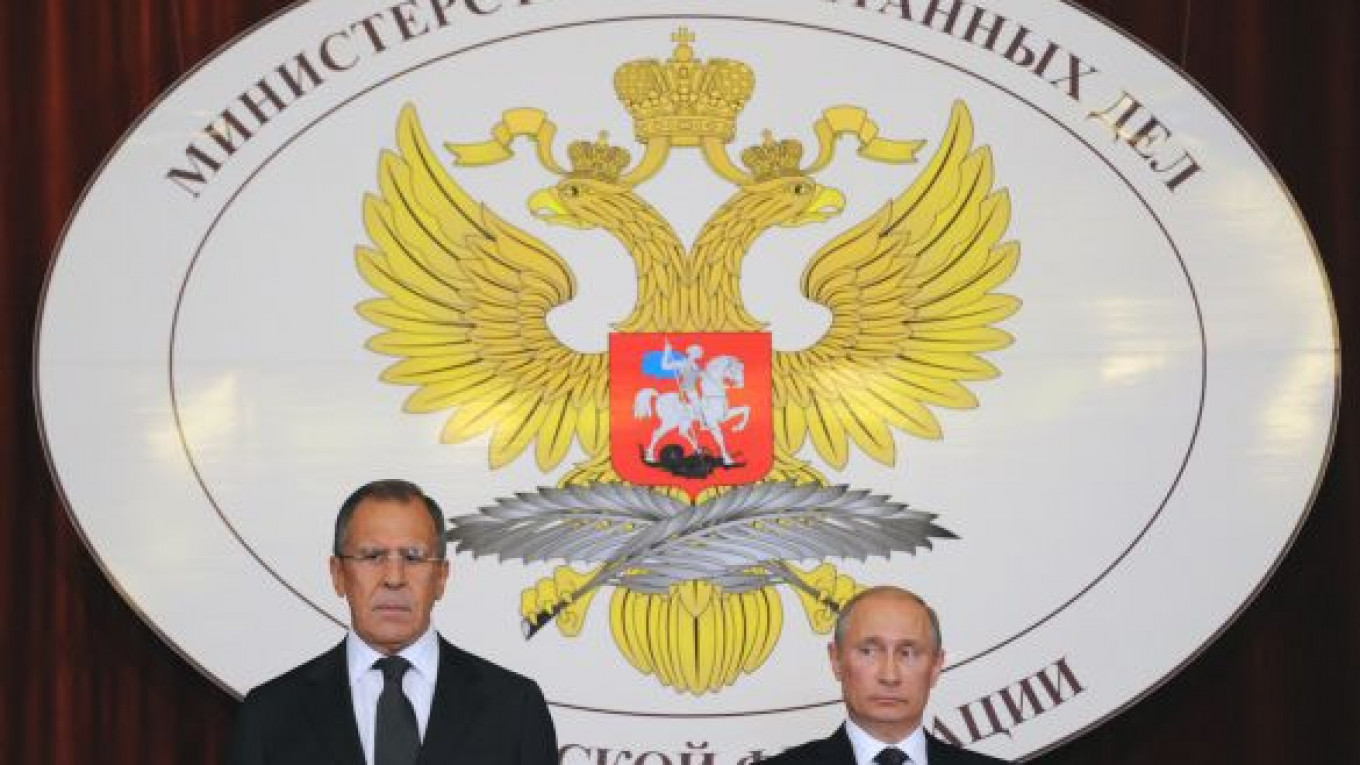Corrections appended
President Vladimir Putin has called on diplomats to use more soft-power tactics to improve Russia's "distorted" image abroad.
Speaking to the Foreign Ministry's annual assembly of ambassadors on Monday, Putin said that envoys should add new technologies, "so-called 'soft powers'" to their traditional work methods.
He argued that the country's image was lopsided — not because of the government's actions but because of its failure to communicate them correctly.
"So far, we must admit that Russia's image abroad is by and large not being formed by us. For that reason, it is distorted and does not reflect the real situation in the country and its contribution to global civilization, science and culture," he said, according to a transcript on the Kremlin's website.
In an apparent jab at Western policies toward Syria and Libya, Putin argued that Moscow was losing the public relations battle by advocating restraint.
"Those who constantly shoot and carry out missile attacks are the good guys, while those who call for dialogue are getting the blame. Our fault is that we do not explain our position well enough," he said.
Putin also knocked the U.S. Congress' plans to enact sanctions against officials implicated in the death of Hermitage Capital lawyer Sergei Magnitsky by saying that this was a reason to be worried.
He said that while Moscow won't "dramatize" the debate of a bill in the middle of the U.S. presidential election campaign season, "to replace the anti-Soviet Jackson-Vanik amendment with an anti-Russian law … cannot leave us without alarm."
Some U.S. lawmakers are calling for linking the annulment of the Cold-War-era Jackson-Vanik legislation to the passing of the Magnitsky bill.
Soft-power politics, originally coined by U.S. scholar Joseph Nye, means to project influence by means of cultural initiatives and humanitarian cooperation.
The concept has long been among Putin's priorities. In 2005, he set up a new department in the presidential administration overseeing foreign cultural relations. The department's mission was described at the time as increasing Moscow's influence in the former Soviet Union.
The Kremlin has also founded state-sponsored think tanks in France and the U.S. and overseen a significant expansion of the state media's foreign reach, including the foundation of RT, the English-language television news channel formerly known as Russia Today.
Analysts have said that Putin's foreign policy concept, which he published in February as part of a series of election campaign , was weak on soft power, mentioning the concept only once, with regard to its use by foreign-funded NGOs.
But in a sign that the concept has not been forgotten, the Kremlin this spring appointed Konstantin Kosachyov, the State Duma's long-standing Foreign Policy Committee chairman, as the new head of Rossotrudnichestvo, the federal agency that oversees relations with former Soviet states.
Kosachyov told Vedomosti in June that his agency's 2 billion ruble ($60 million) budget for this year was insufficient to meet "President Putin's task to widen our global humanitarian presence."
The soft-power concept receded somewhat under Dmitry Medvedev, who held the presidency from 2008 to this year. But Medvedev, whose image as a leader was far softer than Putin's, famously said in 2010 that instead of frightening others by "gnashing teeth," the country should display a smiling face to the world.
On Monday, Putin told ambassadors to keep their focus on Russians living abroad, many of whom, he said, want to be useful to their ancestral homeland: "Sometimes — I say carefully — our foreign missions underestimate this," he said.
Putin also said that the government should make it easier for former Soviet citizens to obtain Russian passports and added that this policy should extend to descendants of those who left the country during the tsarist era, which ended in 1917.
Past Kremlin policies to attract Russians living abroad to improve the country's dire demographic balance have seen little success. For instance, attempts to lure back some of the more than 2 million ethnic Germans who left for their historic home country in the 1980s and 1990s resulted in only a trickle of returnees.
Corrections: An earlier version of this article incorrectly stated the year that the tsarist era ended as 1918, instead of 1917.
An earlier version of this article also incorrectly described a campaign article by Vladimir Putin published in February as mentioning soft power only once with reference to its use by terrorists, instead of with reference to its use by foreign-funded NGOs.
A Message from The Moscow Times:
Dear readers,
We are facing unprecedented challenges. Russia's Prosecutor General's Office has designated The Moscow Times as an "undesirable" organization, criminalizing our work and putting our staff at risk of prosecution. This follows our earlier unjust labeling as a "foreign agent."
These actions are direct attempts to silence independent journalism in Russia. The authorities claim our work "discredits the decisions of the Russian leadership." We see things differently: we strive to provide accurate, unbiased reporting on Russia.
We, the journalists of The Moscow Times, refuse to be silenced. But to continue our work, we need your help.
Your support, no matter how small, makes a world of difference. If you can, please support us monthly starting from just $2. It's quick to set up, and every contribution makes a significant impact.
By supporting The Moscow Times, you're defending open, independent journalism in the face of repression. Thank you for standing with us.
Remind me later.







